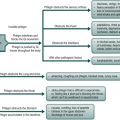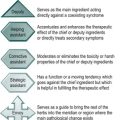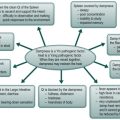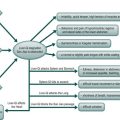6. Syndrome of Lung-Yin deficiency
Manifestations
Main symptoms
Dry cough, dry throat, dry nasal cavities, hoarseness, afternoon fever, warm palms and soles.
Secondary symptoms
Emaciation, red cheeks, scanty and sticky sputum or coughing of blood.
Tongue
Red and dry.
Pulse
Thready and rapid.
Associated disorders in western medicine
Pulmonary tuberculosis, chronic bronchitis, convalescence of acute pneumonia, chronic pharyngitis and bronchiectasis.
Analysis of the syndrome
The Lung is located in the Upper-Jiao. It is a light and delicate organ that is particularly unable to bear heat and dryness.
• When the Yin is too weak to nourish the Lung and its gateway, dry cough, dry throat, dry nasal cavities and hoarseness present.
• If the empty-heat is generated by the Yin deficiency, the heat may consume the Yin and injure the blood vessels, and scanty phlegm and coughing of blood may occur.
• As the cheeks correspond to the Lung, pinkish cheeks often indicate Lung-Yin deficiency. In a severe or chronic case, the empty-heat of the Lung may cause afternoon fever and warm palms and soles.
• If the Yin and essence are both weakened, emaciation may occur.
• A red and dry tongue and a thready and rapid pulse both indicate Yin deficiency.
Treatment principle: Tonify the Lung-Yin
Herb selection principles and formula composition strategies
• First, herbs that are sweet and cold, enter the Lung meridian and are able to nourish the Lung-Yin are selected.
• Second, herbs that are sweet and cold, enter the Kidney and Stomach meridians and are able to nourish the Kidney-Yin, which is the source of the Lung-Yin, are selected, along with herbs that can nourish the Stomach-Yin, which is the mother organ of the Lung. It is equally important to select herbs that tonify the Lung-Qi and Spleen-Qi in order to promote Yin generation.
• Thirdly, herbs that moisten the Lung, regulate the Lung-Qi, eliminate phlegm and soothe the Stomach-Qi are selected.
Structure of the formula and selection of herbs
Chief: Nourish the Lung-Yin
Bai He ( Lilii bulbus)
Bai He is sweet, bland and slightly cold, and enters the Lung and Heart meridians. It has a moistening and lubricating property and can directly moisten the Lung and nourish the Yin. It is suitable for treating all kinds of dryness caused by Yin and body fluid deficiency of the Lung. It is particularly suitable for use in the condition where the Lung-Yin and Heart-Yin are both deficient as it can also nourish the Heart-Yin, which is often injured along with the Lung-Yin in febrile disease as the Lung and Heart are both located in the Upper-Jiao. It is also used for depression and sadness due directly to Lung-Yin and Lung-Qi deficiency. This herb can be used for a reasonably long period of time and can be added to the diet as it is a gentle herb with few side effects.
Bei Sha Shen ( Glehniae radix)
Bei Sha Shen is sweet, bland and slightly cold. It enters the Lung and Stomach meridians. It tonifies the Yin of the Lung in direct and indirect ways as it can nourish both the Lung-Yin and the Stomach-Yin. It can slightly tonify the Lung-Qi and is better used for conditions in which heat injures both the Yin and Qi.
Deputy: Nourish the Kidney-Yin and Stomach-Yin and tonify the Lung-Qi and Spleen-Qi
Sheng Di Huang ( Rehmanniae radix)
Sheng Di Huang is sweet and cold, and enters the Kidney, Heart and Liver meridians. It can quite powerfully nourish the Yin of these organs and in this way can nourish the Lung-Yin indirectly. In addition, as it is quite a cold herb, and the fresh herb is bitter in taste, it can also reduce heat sufficiently. Sheng Di Huang is an excellent herb for use in conditions where the heat is injuring the Yin of the body. Another characteristic of this herb is that it can cool the blood and stop bleeding; because of this it is selected to treat the coughing of blood in conditions of Lung-Yin deficiency.
Tian Men Dong ( Asparagi radix)
Tian Men Dong is sweet, bitter and very cold, and enters the Lung and Kidney meridians. It can strongly nourish the Lung-Yin and the Kidney-Yin and reduce heat. It is particularly used in severe and chronic conditions of Yin deficiency of these organs. Moreover, since it is quite cold and bitter and it can lubricate the intestines and soft stool, it is suitable for use when there is constipation. However, it should be avoided in conditions of weakness of Spleen-Qi and loose stool.
E Jiao ( Asini corii colla)
E Jiao is sweet and neutral, and enters the Liver and Kidney meridians. It is an important substance to nourish the Yin and blood and moisten the dryness. In the formula to treat Lung-Yin deficiency, it is suitable for treating chronic cough, dry cough and coughing of blood.
Xi Yang Shen ( Panacis quinquefolii radix)
Xi Yang Shen is bitter, cold and slightly sweet, and enters the Heart, Lung and Kidney meridians. It is quite a strong herb for tonifying the Yin and Qi of these organs and is able to reduce heat. It is particularly useful in severe and chronic conditions of Yin and Qi deficiency of the Lung.
Dang Shen ( Codonopsis radix)
Dang Shen is sweet and neutral, and enters the Spleen and Lung meridians. It has no function in nourishing the Yin, but it can gently and sufficiently tonify the Lung-Qi. As it is neutral in temperature, it has no side effects of injuring the Yin when it tonifies the Lung-Qi. It is used in the condition where the Yin and Qi are both injured and when the Spleen and Stomach cannot bear very cold herbs in the process of tonifying the Yin.
Assistant: Descend the Lung-Qi, eliminate the phlegm, moisten dryness and soothe the Stomach-Qi
Pi Pa Ye ( Eriobotryae folium), Chuan Bei Mu ( Fritillariae cirrhosae bulbus), Sang Ye ( Mori folium) and Gua Lou Pi ( Trichosanthis pericarpium)
These herbs are cold in temperature and enter the Lung meridian. They are able to descend the Lung-Qi and dissolve phlegm, so they can treat cough and shortness of breath. Of importance is the fact that all are moistening in nature and are particularly suitable for treating Lung-Yin deficiency. They can effectively treat dry cough and scanty phlegm. Unlike most of the pungent and warm herbs, they remove phlegm but do not cause dryness of the Lung.
Envoy: Harmonize the herbs in the formula
Gan Cao ( Glycyrrhizae radix) and Feng Mi ( Mel)
Both herbs are sweet in taste and have a moistening nature; they can moisten the Lung and tonify the Spleen-Qi. In this way, they can harmonize the herbs in the formula and protect the Stomach and Spleen from cold herbs.
Common accompanying symptoms and treatment
• Severe cough with phlegm: add Sang Bai Pi ( Mori cortex) and Gua Lou Ren ( Trichosanthis semen) to remove the phlegm and descend the Lung-Qi.
• Severe coughing of blood: add Bai Ji ( Bletillae tuber)**, Bai Mao Gen ( Imperatae rhizoma) and Xian He Cao ( Agrimoniae herba) to cool the blood and stop bleeding.
• Liver-Qi stagnation with Liver-heat: add Xia Ku Cao ( Prunellae spica) and Bai Shao Yao ( Paeoniae radix lactiflora) to spread the Liver-Qi, reduce the Liver-heat and soften the Liver.
Examples of classical formulas
Bai He Gu Jin Tang (Lily Bulb Decoction to Preserve the Metal) 
Source: Yi Fang Ji Jie quoted from Dr Zhao Ji An 
Composition
Bai He ( Lilii bulbus) 3 g
Sheng Di Huang ( Rehmanniae radix) 6 g
Shu Di Huang ( Rehmanniae radix praeparata) 9 g
Mai Men Dong ( Ophiopogonis radix) 5 g
Xuan Shen ( Scrophulariae radix) 3 g
Chuan Bei Mu ( Fritillariae cirrhosae bulbus) 3 g
Jie Geng ( Platycodi radix) 3 g
Dang Gui ( Angelicae sinensis radix) 3 g
Bai Shao Yao ( Paeoniae radix lactiflora) 3 g
Gan Cao ( Glycyrrhizae radix) 3 g
Analysis of the formula
This is a formula devised for treating Yin deficiency of the Lung and Kidney, which is manifested as cough, coughing of blood, dry throat, bone steaming, night sweats, warm palms and soles, a red tongue without coating and a thready and rapid pulse. The formula focuses on moistening the Lung, reducing the heat and transforming the phlegm from the Lung.
• The chief herbs are Bai He, Sheng Di Huang and Shu Di Huang. They can directly nourish the Yin and reduce heat. They treat the main causes and symptoms of disorders of the Lung and Kidney.
• Mai Men Dong and Xuan Shen serve as deputies. They can reduce heat from the Upper-Jiao and enhance the abilities of the chief herbs.
• The remaining herbs are assistants in the formula:
– Chuan Bei Mu and Jie Geng eliminate phlegm.
– Jie Geng and Gan Cao reduce heat-toxin and benefit the throat.
– Dang Gui and Bai Shao Yao tonify the blood so as to tonify the Yin.
Commentary on strategies
• Lung and Kidney have a mother–son relationship, and the Yin of these two organs is often influenced by each other, especially in chronic conditions. This formula is characterized by selecting herbs that tonify both the Lung-Yin and Kidney-Yin although the main symptoms are directly manifested in the Lung.
• Mai Men Dong is used to nourish the Heart-Yin, and Bai Shao and Dang Gui are used to tonify the blood. They show the understanding of the relationship between Yin and blood, and the relationship between Yin of the Lung, Heart, Liver and Kidney.
Sha Shen Mai Men Dong Tang (Glehnia and Ophiopogonis Decoction) 
Source: Wen Bing Tiao Bian 
Composition
Bei Sha Shen ( Glehniae radix) 9 g
Mai Men Dong ( Ophiopogonis radix) 9 g
Yu Zhu ( Polygonati odorati rhizoma) 6 g
Sang Ye ( Mori folium) 4.5 g
Tian Hua Fen ( Trichosanthis radix) 4.5 g
Bai Bian Dou ( Dolichoris lablab semen) 4.5 g
Gan Cao ( Glycyrrhizae radix) 3 g
Analysis of the formula
This formula is devised for treating Yin deficiency of the Lung and Stomach. This syndrome can be found in the aftermath of febrile diseases where the Yin is injured by heat, and the exogenous pathogenic heat has been eliminated. The manifestations are thirst, dry mouth and cough with scanty phlegm.
In this formula:
• Bei Sha Shen and Mai Men Dong as chief herbs can directly nourish the Lung-Yin; Mai Men Dong can also nourish the Stomach-Yin.
• Yu Zhu and Tian Hua Fen, as deputies, enhance the chief herbs in their functions of nourishing the Yin of the Lung and Stomach.
• The remaining herbs are assistants in the formula:
– Sang Ye clears the heat from the Lung, moistens the Lung and descends the Qi so as to relieve dry cough.
– Bai Bian Dou can gently tonify the Spleen-Qi that is also injured by the pathogenic heat.
– Gan Cao clears heat and benefits the throat.
Commentary on strategies
• In this formula, there are two aspects to the syndrome – the Yin deficiency and the heat that remains in the aftermath of a febrile disease. Many herbs that nourish the Yin of the Lung and Stomach, but do not have a cloying nature, are used, and only one herb (Sang Ye) is used to expel and clear heat. This clearly shows the emphasis of the formula.
• Herbs without a cloying nature are thoughtfully selected to nourish the Yin and disperse heat rather than to drain heat in the aftermath of a febrile disease when the heat is not strong. They follow the treatment principle at this stage.
• When all of these herbs are used together, the Yin can be increased in both organs and the heat is reduced in an effective but gentle way.





